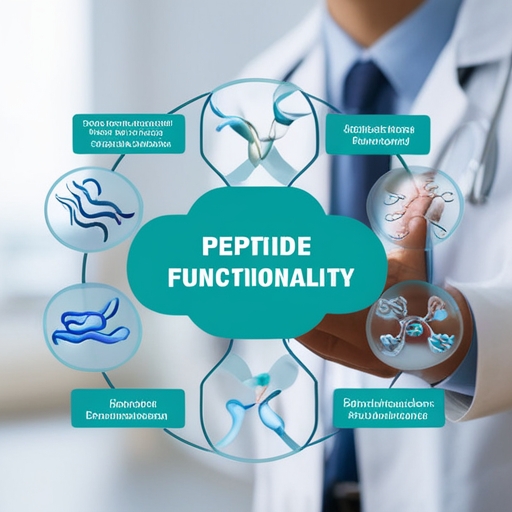FAQs on Peptide Functionality – Unlocking the Secrets of Peptides

Peptides are fascinating molecules that play crucial roles in our bodies and offer exciting potential for medical and cosmetic applications. These short chains of amino acids are smaller than proteins but pack a powerful punch when it comes to biological functions.
What are Peptides?
Peptides are short sequences of amino acids linked by peptide bonds. Unlike proteins, which can contain hundreds or thousands of amino acids, peptides typically consist of 2-50 amino acids. This smaller size allows peptides to easily penetrate the skin and cell membranes, making them valuable for various applications.
Peptide synthesis can occur naturally in the body or be carried out in laboratories. Many peptide manufacturers produce custom peptides for research and medical purposes. The ability to create specific peptide sequences has opened up new possibilities in drug development and cosmetic formulations.
How Do Peptides Work in the Body?
Peptides function as signaling molecules, hormones, and neurotransmitters in the body. They bind to specific receptors on cell surfaces, triggering various biological responses. This targeted action makes peptides ideal for therapeutic applications.
Some key functions of peptides include:
– Regulating hormone levels
– Boosting immune function
– Promoting cell growth and repair
– Influencing neurotransmitter activity
Bioactive peptides can have profound effects on physiological processes, even at low concentrations. This potency has led to increased interest in peptide-based treatments for various health conditions.
Types of Peptides and Their Functions
There are numerous types of peptides, each with unique functions. Some common categories include:
– Hormonal peptides (e.g., insulin, growth hormone)
– Antimicrobial peptides
– Neurotransmitter peptides
– Signaling peptides
Peptide sciences continue to uncover new peptide types and functions. Researchers are particularly interested in peptides that can target specific disease processes or enhance cellular functions.
Benefits of Using Peptides
The potential benefits of peptides are vast and varied. Some key advantages include:
– Improved skin health and reduced signs of aging
– Enhanced muscle growth and recovery
– Boosted immune function
– Better wound healing
– Hormone regulation
Many peptide clinics offer treatments aimed at harnessing these benefits. However

, it's crucial to consult with a healthcare professional before starting any peptide therapy.
Peptides in Skincare
The cosmetic industry has embraced peptides for their anti-aging properties. Peptides in skincare products can:
– Stimulate collagen production
– Improve skin elasticity
– Reduce the appearance of wrinkles
– Enhance skin hydration
Many online peptide stores offer peptide-based skincare products. However, it's essential to verify the quality and purity of these products before use.
Peptides in Muscle Building
Athletes and bodybuilders often turn to peptides to enhance performance and muscle growth. Some peptides can:
– Stimulate growth hormone release
– Promote muscle protein synthesis
– Improve recovery time
– Enhance fat burning
While some peptides are legal for this purpose, others may be classified as performance-enhancing drugs. It's crucial to understand the peptide legality in your region before use.
Potential Side Effects of Peptides
While peptides are generally considered safe when used correctly, they can have side effects. These may include:
– Injection site reactions
– Headaches
– Nausea
– Joint pain
Peptide safety should always be a top priority. Always purchase peptides from reputable peptide suppliers and follow recommended dosages.
How to Use Peptides Safely
To ensure safe use of peptides:
1. Consult with a healthcare professional
2. Purchase from reputable sources
3. Follow proper peptide reconstitution procedures
4. Adhere to recommended dosages
5. Monitor for side effects
Many peptide certificates are available to verify product quality and purity. Always look for these certifications when purchasing peptides.
Peptides vs. Proteins: What's the Difference?
While both peptides and proteins are made of amino acids, they differ in several key ways:
– Size: Peptides are smaller (2-50 amino acids) compared to proteins (50+ amino acids)
– Structure: Peptides have simpler structures, while proteins can have complex 3D shapes
– Function: Peptides often act as signaling molecules, while proteins have diverse roles including structural and enzymatic functions
Understanding these differences is crucial for researchers and consumers alike.
Natural Sources of Peptides
While many peptides are synthesized, natural sources exist. Some foods rich in peptides include:
– Eggs
– Milk and dairy products
– Fish and seafood
– Soy products
– Wheat and other grains
Incorporating these foods into your diet can provide natural peptide benefits.
Peptides in Medical Treatments
The medical field is increasingly turning to peptides for various treatments. Some applications include:
– Cancer therapy
– Autoimmune disease management
– Hormone replacement therapy
– Alzheimer's disease treatment
Many peptide warehouses supply peptides for medical research and clinical trials.
How Are Peptides Synthesized?
Peptide synthesis typically involves one of two methods:
– Solid-phase synthesis
– Liquid-phase synthesis
These processes allow for the creation of custom peptide sequences for research and medical applications.
Regulation and Legality of Peptides
The regulation of peptides varies widely depending on their intended use and the country in question. In the United States, the FDA regulates peptides used as drugs, while cosmetic peptides fall under different regulations.
USA peptides must comply with specific regulatory requirements. Always check local laws before purchasing or using peptides.
Common Myths About Peptides
Several misconceptions exist about peptides:
– Myth: All peptides are steroids
– Fact: Peptides and steroids are distinct chemical compounds with different structures and functions
– Myth: Peptides always require injection
– Fact: While some peptides are injected, others can be applied topically or taken orally
– Myth: Peptides work instantly
– Fact: Most peptides require consistent use over time to see results
Future Research and Developments in Peptide Science
The field of peptide science is rapidly evolving. Future developments may include:
– New therapeutic applications
– Improved delivery methods
– Enhanced peptide stability
– More efficient synthesis techniques
Peptide analysis techniques are also advancing, allowing for better quality control and purity testing.
Conclusion
Peptides offer exciting possibilities for health, wellness, and medical treatments. As research continues, we're likely to see even more applications for these versatile molecules. However, it's crucial to approach peptide use with caution, always prioritizing safety and consulting with healthcare professionals.
Frequently Asked Questions
How long do peptides last once reconstituted?
Peptide shelf life after reconstitution varies, but most last 1-2 weeks when refrigerated. Always check specific storage instructions for each peptide.
Are peptide powders better than peptide solutions?
Peptide powders often have a longer shelf life, but solutions can be more convenient. The best choice depends on your specific needs and usage patterns.
How can I verify the authenticity of my peptides?
Look for peptide authentication certificates from reputable suppliers. Some companies offer peptide purity tests or batch testing information to verify product quality.
